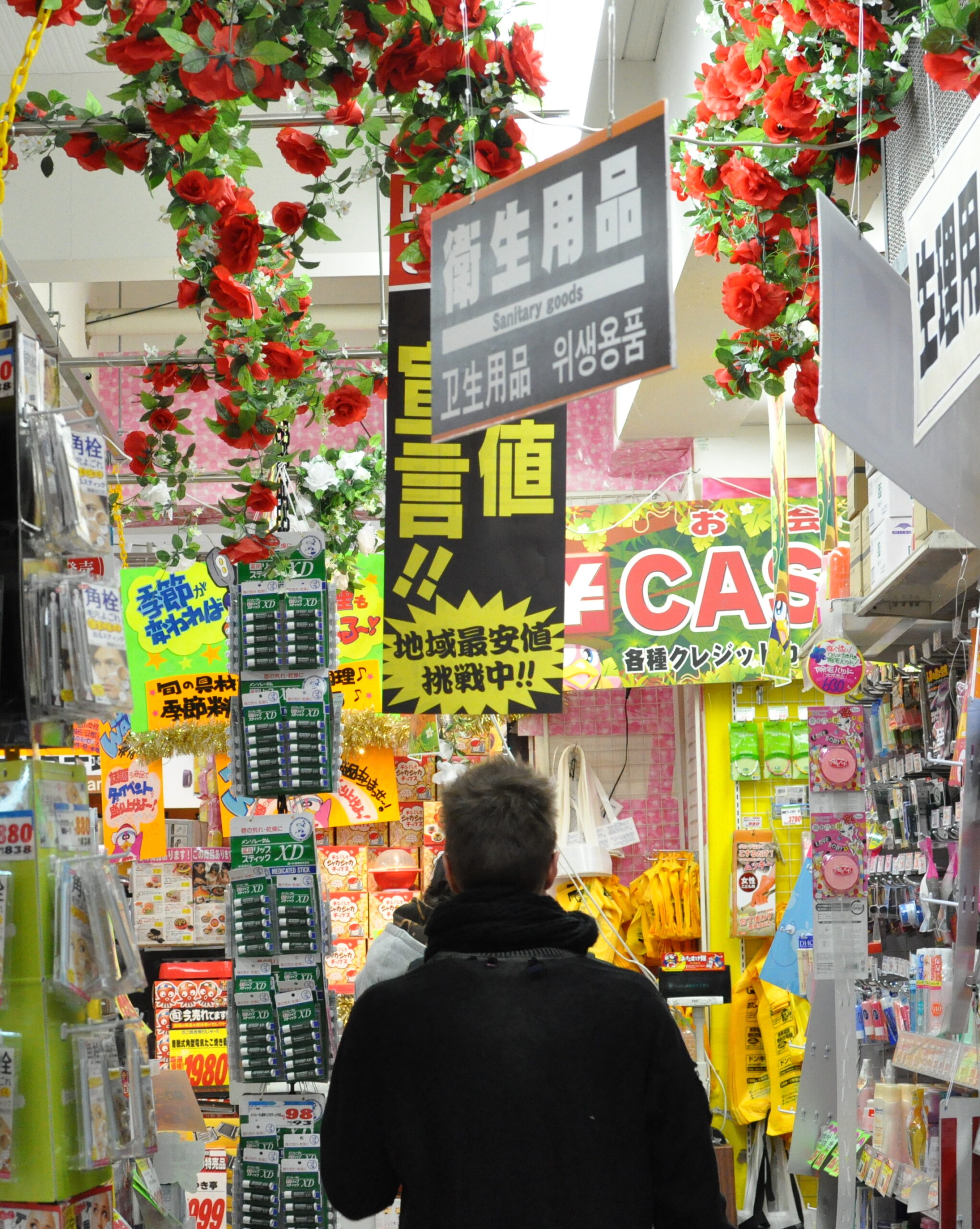
Tokyo, Japan
The superiority of Japanese convenience stores—conbini—is no longer a secret to the world. Although most residents of Japan consider these corner stores an unremarkable albeit essential element of daily life, the rapid spread of Japanese soft power in the last decade has elevated conbini from a matter of insider knowledge to a must-see attraction featured in travel guides. Prior to Japan’s strict COVID-19 travel restrictions, tourists would flock to Tokyo’s conbini to bask in the novelty of a 7-Eleven that boasts fresh salmon onigiri and matcha purin instead of slurpees and $1 coffee.
Popular chains like 7-Eleven and Family Mart are clean, well-stocked, and seldom overcrowded—at least in residential areas, where Tokyo’s meticulous urban planning ensures that every neighborhood has a conbini within walking distance, often one (or two!) on every block.
However, there is one convenience store chain lesser known to foreigners despite its ubiquity in Tokyo: Don Quijote, often shortened to Donki. I first visited one of its stores when my family moved to Tokyo last year, returning after nearly twenty years to the city where I was born.
When I returned home during winter break, I did my best to avoid entering Don Quijote—such was my aversion to its garish yellow branding and overflowing displays. My father shared my apprehension, so we would wait outside and twiddle our thumbs whenever my mother wanted to stop in and buy something. She would insist that their prices were unmatched and exit the store with a highly specific kitchen tool or household appliance that we apparently needed desperately.
I succeeded in evading Don Quijote until the end of my visit, when I discovered that no other store sold my preferred face wash.
As soon as I stepped foot in the store, my senses were inundated. Don Quijote makes no attempt to follow the traditional model of neat and unobtrusive conbini; its aisles were bathed in flashing lights and lined with neon signs brandishing sale prices. My head spun as I followed arrows pointing to various products, and I soon abandoned my mission to find face wash, instead pausing every few feet to gawk at gimmicks like teeth wipes and heated eye masks. In addition to the visual excesses, the incessant noise created an atmosphere closer to an arcade or nightclub than a retail store. Countless miniature video screens played advertisements on a perpetual loop, their tinny voices shouting at me to buy this mascara and try this muscle ache cream. Above it all, overhead speakers blasted fast-paced, saccharine pop songs, creating a steady drone of sound. My temples began to throb and I grew frantic as I stumbled past the video screens, struggling to remember the one product I needed.
After about ten minutes, which felt like an hour, I prodded my mother in the arm, asking to leave the store. Bemused by my discomfort, she shrugged me off, seemingly oblivious to the sensory overload I was experiencing. Just like me, she despises loud noises and tackiness, but I suppose the unpleasant ambiance was a small inconvenience in comparison to the unbeatable price point. My favorite Meiji chocolate-covered almonds were 200 yen (almost two dollars) less than most other stores—nothing to scoff at.
Yet Don Quijote’s practical offerings—the hygiene products, cleaning supplies, groceries—were an afterthought to its crude exhibition of consumerism. There was a product to meet every need; a remedy to every insecurity. The beauty products, in particular, catered to the darker side of societal expectations in Japan. The Don Quijote closest to my home in Tokyo dedicates an entire corner of its first floor to colored eye contacts for young women. It also carries other forms of body augmentation like waist trainers, skin whitening cream, and eyelid tape—all wrapped innocuously within pink packaging and endorsed by beaming models. The kitschy nature of the store cleverly masked the true purpose of the products. Don Quijote is far from the sterile and homogenous Japan that seems to reign supreme in the American consciousness, a distant land of bullet trains, androids, and salarymen.
I finally attained a semblance of peace upon ascending to the second floor, the home of the food section. While I couldn’t escape the music, the dreaded video ads stayed safely below me and the blinking signs gave way to the calming familiarity of grocery store-style fluorescent strip lights. The novelty items were replaced with functional pantry staples: biscuits, miso soup packets, instant coffee.
While stocking up on my preferred brand of chocolate, a gaggle of young boys ran past me, no older than eight or nine. Dwarfed by their perfectly rectangular backpacks (a mainstay of Japanese school uniforms), they wove through the narrow aisles with practiced ease, beelining to the snacks. Unlike me, they were unfazed by the temptations surrounding them, too busy chattering about playground drama. I suddenly felt foolish. I wasn’t sure why Don Quijote, a mere convenience store, had inspired such vitriol in me.
After the little boys grabbed their snacks of choice, they dashed back down to the cash registers to pay. In and out. I smiled as they skipped out of the store with the same energy with which they had entered. Get the discount and leave, no time for aimless perusing.
I should be more like these kids, I thought. Accept Japan as it is, embrace the noise and the disarray beyond Tokyo’s manicured facade. Although I was embarrassed to feel so out of place in my new/old home, I realized that my unfamiliarity came with benefits of its own. An entire world left to discover.
Sophie Durbin is a sophomore at Amherst College and an editorial assistant for The Common.
Photo by Flickr user Amber Case.




